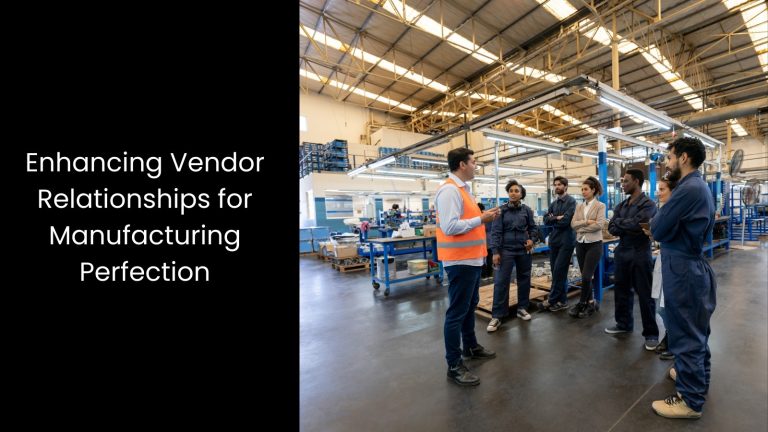Raw materials arrive just in time, seamlessly integrated into flawless products that meet precise deadlines. Isn’t this the dream of every manufacturer in Singapore? But this symphony of efficiency can easily turn into a chaotic cacophony if one element is off-key. That element is your vendor. They are the lifeblood of your production line, supplying the essential ingredients that turn your vision into reality. But simply selecting a vendor is not enough. In the complex manufacturing world, where quality, cost, and efficiency play a larger role, cultivating strategic vendor relationships is the secret sauce. Therefore, why is vendor management not just a best practice but a vital cornerstone of success in manufacturing?
In this article, let us go deeper and discover how a well-oiled vendor management system can transform your manufacturing operations in Singapore.
We will know
What is Vendor Management?

- Not just in manufacturing, but every other industry needs vendor management. This actually involves actively overseeing relationships with companies that supply goods or services to a business.
- It also includes selecting vendors based on criteria like quality and cost, negotiating contracts, and ensuring they meet agreed-upon standards. This was done manually, with many mistakes in the past. But now the time has changed. In the manufacturing world, managers now use software to track vendor performance, analysing metrics such as delivery times and product quality to make informed decisions.
- Effective vendor management aims to minimise risks and optimise supply chain efficiency, identifying and resolving issues promptly to maintain smooth operations. Through this special network of suppliers, managers also handle tasks such as ordering, invoicing, and resolving disputes, establishing communication to build strong partnerships with vendors.
- Yes, in this dynamic world, managing vendors strategically is like releasing an arrow towards success. This way, businesses can streamline processes, reduce costs, and enhance overall productivity, ultimately contributing to their success in the market.
Importance of a Vendor Management System for Manufacturing Singapore

Supply Chain Optimisation
This is specifically crucial for the supply chain in manufacturing, especially for companies in Singapore seeking to optimise operations. Let us explain why.
You know, manufacturing is a complex stage where every component must synchronise perfectly. Effective vendor management ensures a steady flow of high-quality materials delivered punctually and within budget.
If the manufacturers can implement vendor management systems, they can streamline procurement processes through software tools that track vendor performance metrics such as delivery times and product quality. This allows authorities to make data-driven decisions, enhancing efficiency and reducing production delays.
With optimised vendor management, manufacturing companies in Singapore can minimise inventory costs, improve product quality through consistent material supply, and reduce lead times.
The best thing about this is that these benefits transform into smoother production cycles, enabling companies to meet customer demands promptly and uphold high standards of service.
There must be a robust Vendor Management System for every manufacturing company to make strong partnerships with reliable suppliers, strengthening the manufacturing ecosystem in Singapore and ensuring sustained competitiveness in the global market.
Cost Control
A strong vendor management strategy can significantly impact the bottom line of a manufacturing company. Did you know this?
As it lets companies actively foster competitive bidding practices, negotiate favourable contract terms, and identify cost-saving opportunities through effective vendor relationships, they can streamline their spending and maximise profitability.
Vendor management systems utilise software tools to track and analyse vendor performance metrics, such as pricing trends and delivery efficiency. This will allow managers to make informed decisions that optimise procurement processes. This approach helps in maintaining cost efficiency by ensuring that materials and services are sourced at competitive prices without compromising quality.
It goes without saying that proactive vendor management mitigates financial risks associated with supply chain disruptions or price fluctuations, enhancing financial stability for manufacturing operations.
Therefore, as you can see, by implementing robust vendor management practices, companies not only control costs but also improve operational efficiency, minimise waste, and maintain consistent product quality. Ultimately, this strategic approach supports sustainable growth and competitiveness in the manufacturing sector in Singapore.
Risk Mitigation
The manufacturing landscape is vulnerable to diverse disruptions. This ranges from material shortages to quality control issues.
If proactive vendor management is implemented, it will help mitigate these risks by establishing robust relationships with dependable suppliers and implementing stringent performance monitoring protocols. Through vendor management systems, companies can track supplier performance metrics such as delivery reliability and product quality using specialised software tools.
This proactive action allows manufacturers to identify potential risks early and take preemptive actions to prevent disruptions in production. As it backs up transparent communication and collaboration with vendors, manufacturing firms can address issues promptly and maintain continuity in their supply chains.
Moreover, effective vendor management enhances resilience against unforeseen challenges, such as market fluctuations or geopolitical uncertainties, by diversifying supplier networks and ensuring contingency plans are in place.
This strategic approach not only safeguards against operational interruptions but also strengthens overall business continuity and competitiveness. This way, vendor management aids manufacturing companies in Singapore in navigating uncertainties more effectively, sustaining operational stability, and upholding high standards of product quality and customer satisfaction in the global marketplace.
Quality Assurance
The quality of the finished product depends on the quality of the raw materials and components used.
This is where the above-said software enters the spotlight. Vendor management empowers companies to establish clear quality standards with suppliers, conduct regular inspections, and hold them accountable for meeting specifications.
Through vendor management systems, companies can use software tools to track and analyse supplier performance, ensuring adherence to quality standards. This proactive nature helps maintain a consistent, high-quality output, which builds trust and brand loyalty with customers.
If they can closely monitor vendors, companies will be able to quickly identify and address any quality issues, preventing defective materials from entering the production line. How can you forget about regular audits and performance reviews? This will further ensure that suppliers continually meet the required standards.
This systematic management of vendor relationships not only guarantees product quality but also enhances the overall efficiency and reliability of the manufacturing process.
Innovation and Collaboration
Did you know that the best vendor relationships are not transactional; they are collaborative?
Since the latter establishes open communication and information sharing with vendors, companies can spark innovation and explore new possibilities for material sourcing, production techniques, and cost-saving measures. When it comes to Vendor Management Systems, they contain software tools to facilitate seamless communication and data exchange, enabling manufacturers to work closely with their suppliers.
This collaboration can lead to the development of new materials. Plus, it improves production processes and provides innovative solutions that enhance product quality and efficiency. When it is possible to engage vendors as partners rather than mere suppliers, companies can enhance their expertise and insights to drive continuous improvement and competitive advantage.
It is visible that collaborative vendor relationships also encourage joint problem-solving, helping to address challenges more effectively and develop cutting-edge technologies. This strategic approach supports a culture of innovation within the manufacturing ecosystem, leading to better products and increased market success.
Cerexio Solution for Better Vendor Management

Cerexio, as an industry expert in the manufacturing domain, offers various software solutions to build and manage relationships with vendors. Understanding its complex nature, our solutions have embedded features like Predictive Analytics, Artificial intelligence, Digital Twin, etc. to provide the best solutions for the manufacturing world.
Enhancing Vendor Relationships for Manufacturing Perfection

With the ability to invest in strong vendor relationships and implement effective management strategies, you can create a well-oiled machine that delivers manufacturing perfection. Remember, satisfied vendors become invested partners, working alongside you to achieve mutual success. So, prioritise your vendor relationships with a suitable software partner, and watch your manufacturing dreams become a reality.
